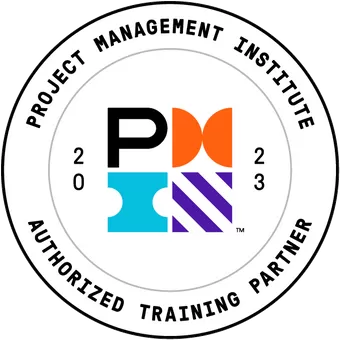
PMI-RMP® Certification Training - Risk Management Professional Course
Accredited by PMI, the PMI-RMP® course trains you in professional risk management, equipping you to identify, assess, and mitigate project risks, ultimately saving time and resources.
Choose Delivery Methods / Available Dates



Why Bakkah?
What is Risk Management?
Risk management is a structured approach to tackling potential threats that negatively affect achieving objectives of projects. This process encompasses a set of steps that include identifying, assessing, and controlling threats. Organizations apply these steps to reduce risks’ impact that can lead to delaying the project’s schedule and reducing its quality.
The PMI-RMP is one of the most in-demand certifications in risk management as it entitles individuals to identify potential risks early so they can save costs and minimize surprises and financial losses. This certificate also guides you on how to increase project success rate by effectively collaborating and communicating with team members that enhance the project’s efficiency.
What to Expect from this PMI-RMP Certification Training?
Upon completion of the RMP certification course, you’ll be able to manage risks professionally by achieving these goals:
1- Familiarity with risk management fundamentals
With the RMP course, you’ll learn core risk management concepts, practices, and principles and acquire the must-have knowledge of applying risk management tools and techniques in the project according to the PMBOK® guide.
2- Professional Implementation of risk management
You’ll learn how to identify risks and the must-have tools and techniques for executing this process and learn how to minimize the risks’ impact by developing a plan response risk. Additionally, you’ll be familiar with mainstreaming risk management practices to all project phases.
3- Enhancing risk management skills
PMI-RMP course highlights improving risk management skills as it guides you to make informed decisions and analyze data so you can refine decision-making and analytical skills. Additionally, you’ll learn how to hone communication skills with team and stakeholders.
4- Preparing for the PMI-RMP exam
You’ll be geared up to pass the exam certification confidently and earn global recognition with the PMI-RMP prep course.
Who Needs this Risk Management Professional Training?
PMI-RMP training is geared at individuals who are seeking in-depth knowledge and acquiring risk management skills for projects, so the target audience includes:
- Project Managers.
- Program Managers.
- Executive Managers.
- Chief Project Officers.
- Risk Managers.
- Project Management Officers.
- Project Planners.
- Project Coordinators.
- Risk officers.
- Others who are directly or indirectly involved in Project Risk Management.
What are the acquired skills of the RMP certification course?
Risk management certification demonstrates your versatility in project risk management through these in-demand skills:
- Identifying risks.
- Planning risk management.
- Applying risk response plan.
- Monitor and control risks.
- Qualitative and quantitative analysis.
- Emerging risk management tools and techniques.
- Strategic alignment.
- Data analysis.
- Communication and collaboration with teamwork.
Live Online PMI-RMP Training
Check out all the details you need to know about PMI-RMP offered by Bakkah:
- 5 days of training.
- Exam Simulation
- Group Activity (Break-out Session) after each lesson.
- Practice Tests.
- Access to additional References – Glossary/ Recommended Reading/ Syllabus.
- The material language will be English.
PMI-RMP Practice Exam Overview:
The PMI-RMP exam preparation requires to know how to book the exam, the eligibility requirements, and the exam questions:
PMI-RMP® exam is now available as an online proctored exam via Pearson VUE. The exam offers convenience to you to be taken at your home, office, or anywhere. However, there are guidelines that you must follow and ensure before taking the exam.
You can take the exam day or night with 24/7 testing options to accommodate your schedule. All you need when you are ready to take the exam is:
- To schedule your online or center-based exam soon as appointments are limited and filling fast
- A computer with a webcam
- A reliable internet connection
- A quiet space where you can spend a few uninterrupted hours.
What are the PMI-RMP Exam Prerequisite?
- Secondary degree (high school diploma, associate’s degree, or the global equivalent).
- 36 months of project risk management experience within the last 5 years.
- 40 hours of project risk management education.
OR
- Four-year degree (bachelor’s degree or the global equivalent).
- 24 months of project risk management experience within the last 5 years.
- 30 hours of project risk management education.
RMP Exam Questions Format:
- No. of Scored Questions (100).
- No. of Pretest (Unscored) Questions (15).
- Total Examination Questions (115).
- Allotted Examination Time (2.5 Hours).
Course Inclusions
Introduction to risk management
- Introduction to PMI-RMP® Certification Course
Identify Risks
- Risk identification
- Risk analysis tools and techniques
- Risk monitoring and control techniques
Plan Risk Management
- Main Activities in Risk Management
- Plan Risk Management Process
- Stakeholder Analysis
- Inputs, Tools & Techniques and Outputs
Introduction to Project Risk Management Process
- Project Risk Management Process
Perform Quantitative Risk Analysis process
- Quantitative Risk Analysis process
- Quantitative risk analysis tools and techniques
Principles and Concepts
- Project Risks
- Risk Attitudes
- Role of Project Manager
- Risk Appetite & Threshold
Modelling & Simulation, Monte Carlo Simulation
- Monte Carlo Simulation
Risk Management Framework
- Project Management Introduction
- Risk Introduction
- Risk Management
- Risk Breakdown Structure (RBS)
- Project risk management
Perform Qualitative Risk Analysis process
- Qualitative Risk Analysis process
- Qualitative risk analysis tools and techniques
Plan Risk Response
- Risk response activity
- Risk response metrics
- Risk Contingency Reserves
Implement Risk Response
- Implement Risk Response
- Tools & Techniques to Implement Risk Response
Monitor Risks
- Purpose and Objectives of Monitor Risks
- Critical Success Factors
- Inputs, Tools & Techniques, and Outputs
Additional Topics
- Critical Path Analysis
- Project Communication Management
- Project Stakeholders Management
- Project Procurement Management
For Business
Empower Your Team with World-Class Corporate Training
Tailored learning experiences for businesses of all sizes. Boost productivity, close skill gaps, and unlock your team's full potential with Bakkah globally accredited programs.
FAQs
Through Bakkah, you can easily purchase the exam voucher. However, the registration and examination processes are handled directly between the trainee and the accreditation body. As an accredited partner, we can provide support whenever needed, but are not responsible for issues related to technical problems, scheduling, or your exam readiness.
Everyone who earns a PMI certification (with the exception of the CAPM® certification) must actively maintain their certification(s) through participation in the CCR Program and renewal of their certification(s) every 3 years.
- Secondary degree (high school diploma, associate’s degree, or the global equivalent)
- 36 months of project risk management experience within the last 5 years.
Or
- Four-year degree (bachelor’s degree or the global equivalent).
- 24 months of project risk management experience within the last 5 years
- Secondary degree (high school diploma, associate’s degree, or the global equivalent)
- 36 months of project risk management experience within the last 5 years.
Or
- Four-year degree (bachelor’s degree or the global equivalent).
- 24 months of project risk management experience within the last 5 years
Yes, PMI
No.
Online and Self-Study.
No, course’s fees include only training services.
3.5 Hours.
English.
- Candidates who take a computer-based examination receive the exam report at the test center the day they sit for the examination.
- You can also access your exam report on the online certification system no later than 10 business days after your examination date.
- You will receive an email notifying you when your exam report is available online.
- Candidates who take a paper-based examination will NOT receive the exam report the day of the exam.
- You will be able to access your exam report on the online certification system approximately six to eight weeks after your examination date.
- You will receive an email notifying you when your exam report is available online.
The passing score for all PMI exams is determined by sound psychometric analysis.
You are granted a one-year eligibility period in which to pass the examination. During the eligibility period, you may take the examination up to three times because candidates do not always pass the examination on their first attempt. Gauge your time carefully to leave enough time during the eligibility period to retake the examination if needed.
You can reschedule or cancel your computer-based exam at any time, as long as you do so more than two full calendar days before your scheduled exam appointment.
Within six to eight weeks, you will receive a certification package that includes: Congratulatory letter Information on how to maintain and renew your Certification.
Within six to eight weeks, you will receive a certification package that includes: Congratulatory letter Information on how to maintain and renew your certification.
English.
English.

